Vilnius 700 Symposium

Register to attend via Zoom
Register for in-person symposium attendance
This two-day symposium brings together thinkers and writers engaged in the history and life of Vilnius to reflect on the role, space, and place of the city and its peoples. Vilnius encompasses centuries-long historical, cultural, and political significance to many nations of Central and Eastern Europe including Lithuanians, Poles, Jews, Belarusians, and others. The goal of the Vilnius 700 symposium at Yale is to reach for a better understanding of Vilnius both as a place and as an idea, a city with a multiplicity of peoples and voices – a wealth of polyphony.
The Baltic Studies Program at Yale invites you to celebrate the 700th anniversary of the first written mention of Vilnius in historical sources by joining a keynote conversation, four panel discussions, and a musical recital with some of the leading scholars, artists, and practitioners of Vilnius’ past, present, and future.
Day 1 - October 12, 2023
10:00 am - 12:00 pm - Beinecke Rare Book & Manuscript Library (121 Wall St.); Classroom 38
Optional Guided tour and presentation of Vilnius-related archives
1:00 pm - 1:30 pm - Sterling Memorial Library (120 High St.); Lecture Hall
Welcoming Remarks
Introduction: Edyta Bojanowska, Professor of Slavic Languages and Literatures and Chair of the European Studies Council
A message from Vilnius: Vice Mayor Simona Bieliūnė
Welcoming remarks: Ambassador of Lithuania in the United States Audra Plepytė
1:30 pm - 2:15 pm
Vilnius 700 Symposium Keynote
Supported by the George Herbert Walker Jr. Lecture Fund
Keynote speaker: Dr. Kristina Sabaliauskaitė
Moderator: Maksimas Milta (Yale University)
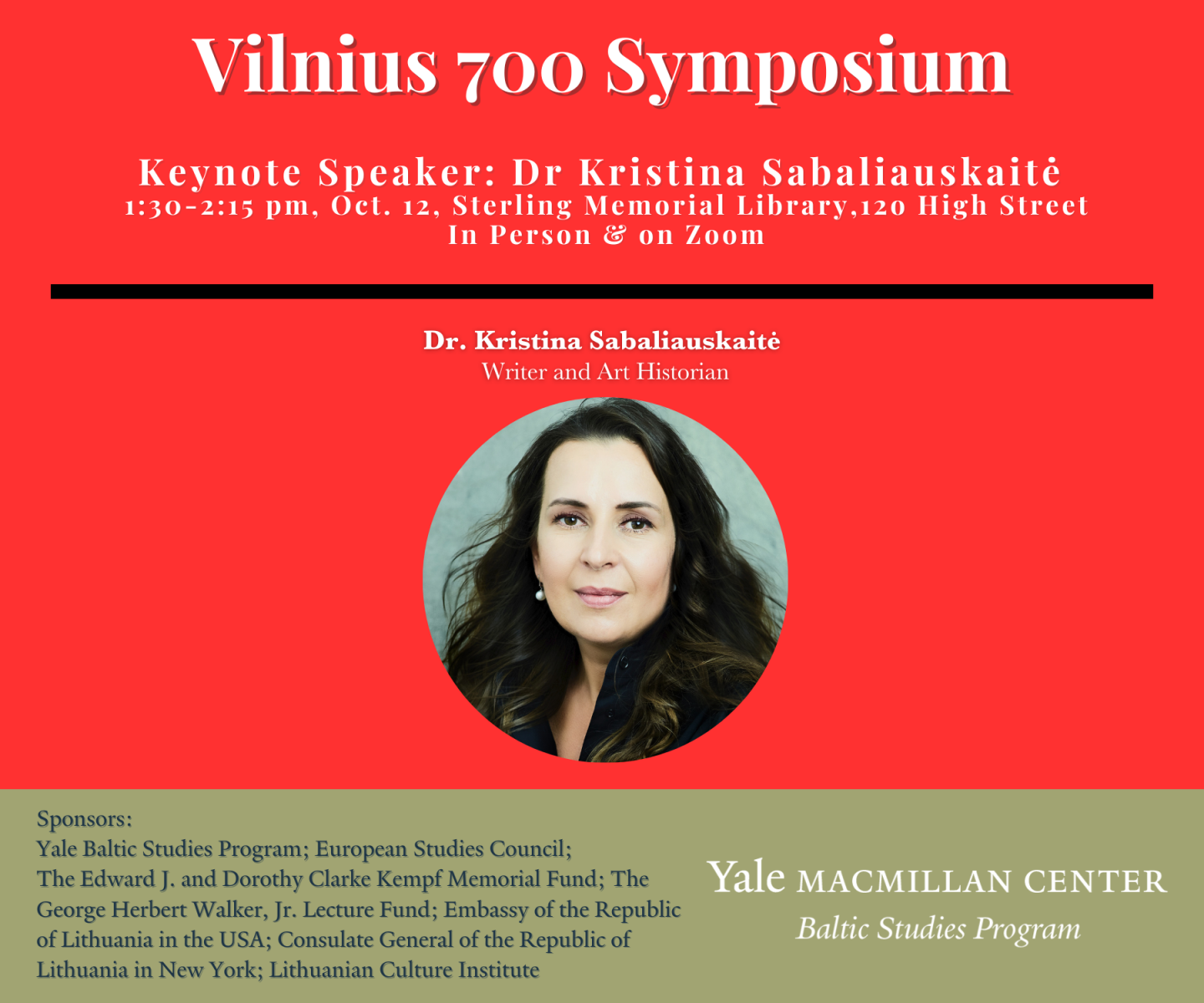
2:15 pm - 2:30 pm
Break
2:30 pm - 4:00 pm
Panel 1: Vilnius as a Place of History
Vilnius, a city with a remarkable polyphonic historical legacy, takes center stage in this panel. The session delves into the multifaceted history of this city with participants exploring the city’s pivotal role in shaping the region’s historical narratives and its broader significance within the history of Europe.
The panelists will examine intricate historical events and transformations from medieval times to today in which Vilnius served both as a place and as an idea for the nations of the region. Through captivating insights and interdisciplinary perspectives, this panel aims to deepen our understanding of Vilnius as a place of historical significance and its enduring impact.
Professor Emeritus Tomas Venclova (Yale University)
Professor Theodore Weeks (Southern Illinois University at Carbondale)
Professor Darius Staliūnas (Lithuanian Institute of History)
Professor Violeta Davoliūtė (Lithuanian Institute of History)
Moderator: Dr. Bradley Woodworth (Yale University / University of New Haven)
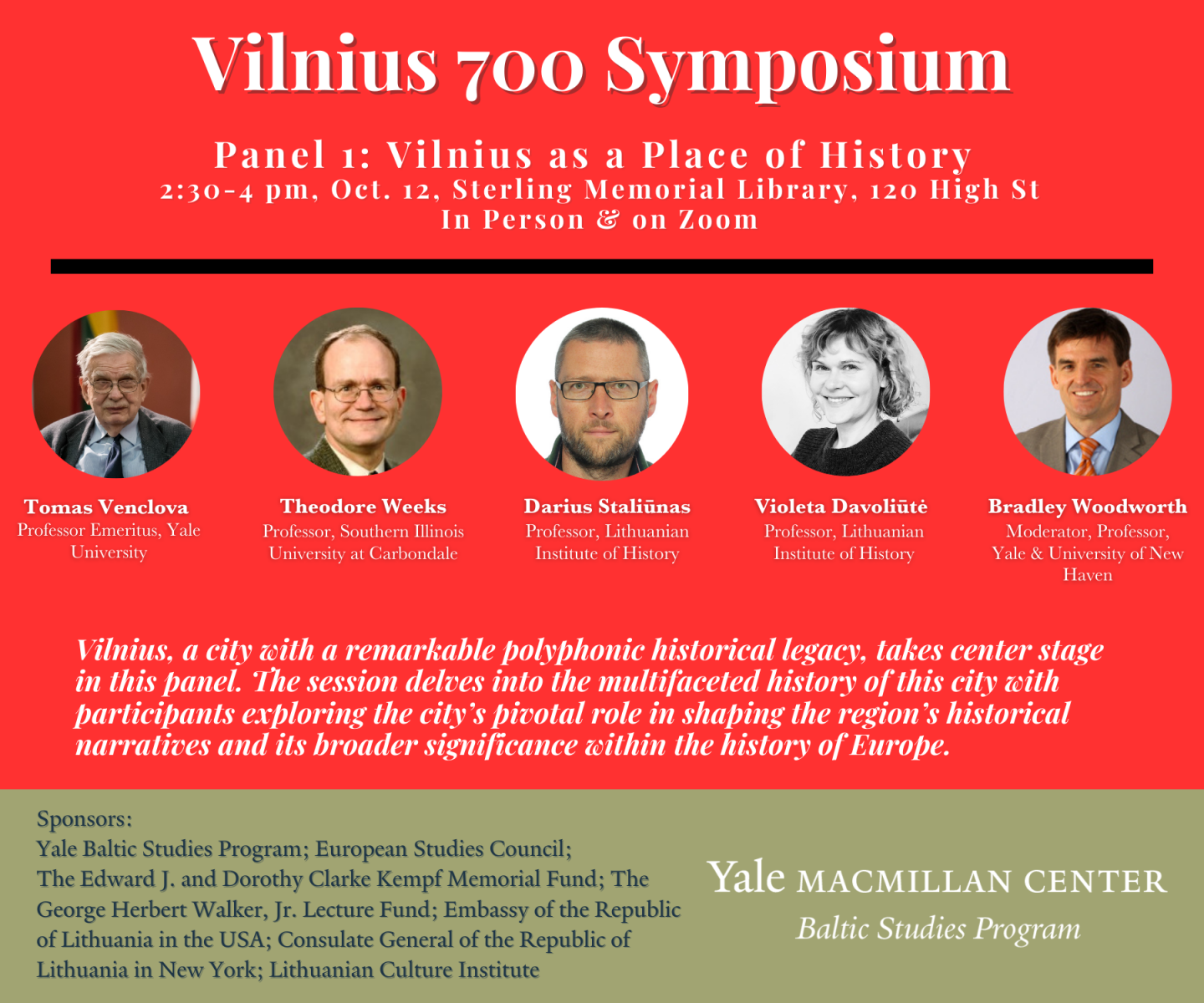
4:00 pm - 4:30 pm
Coffee Break
4:30 pm - 6:00 pm
Panel 2: Vilnius as a Place of Culture, Arts, and Faith
This panel delves into the diverse tapestry of Vilnius’s cultural and confessional expressions, exploring its historical roots, contemporary manifestations, and spiritual and artistic dimensions. How does the cultural significance of Vilnius contribute to the collective imagination in the region?
Through a multidisciplinary lens, panelists will examine the city’s heritage, encompassing its architecture, literature, visual and performing arts. Additionally, the panel will delve into the intertwining of spirituality and cultural identity in Vilnius, exploring the role of religious traditions, philosophical movements, and sacred spaces for the nations of the region. By exploring the rich cultural and spiritual tapestry of Vilnius, this panel seeks to celebrate the city’s unique contributions to the landscape of Europe’s East and beyond.
Dr. Jonathan Brent (YIVO)
Dr. Jūratė Čerškutė (Institute of Lithuanian Literature and Folklore)
Professor Timothy Snyder (Yale University)
Ambassador Dr. Irena Vaišvilaitė (Vilnius University)
Moderator: Maksimas Milta (Yale University)
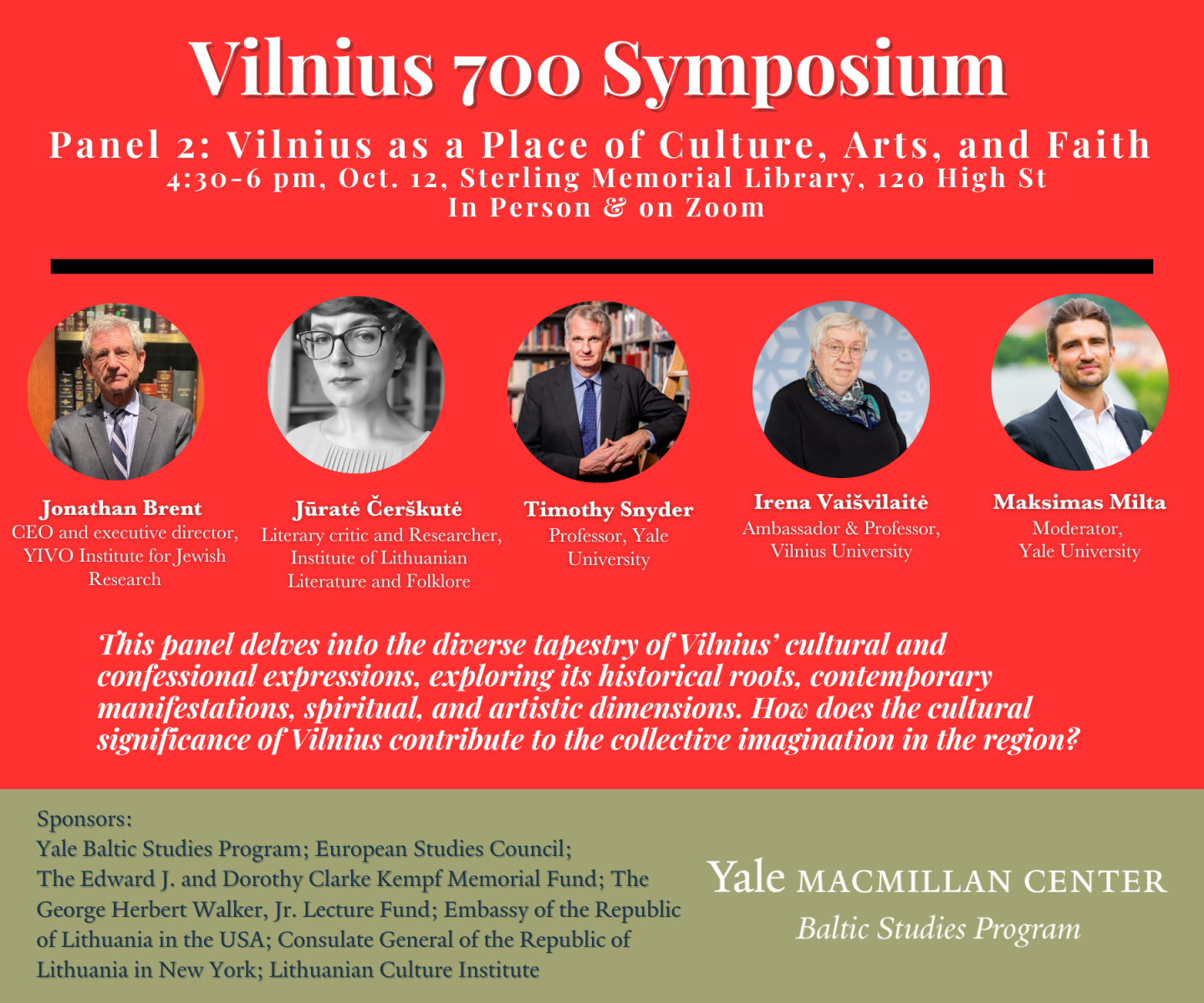
6:30 pm - 7:30 pm - William L. Harkness Hall (100 Wall St.); Room 201 (Sudler Hall)
Musical Recital
Music performed by the Haven String Quartet and Andrius Žlabys
Selections include
Mikalojus Čiurlionis, String Quartet No. 1 in C Minor
and
Andrius Žlabys, Movement for String Quartet and Piano
7:45 pm - 9:30 pm - Humanities Quadrangle (320 York St.), Room 131
Reception hosted by H.E. Ambassador of Lithuania to the United States Audra Plepytė and Consul General of the Republic of Lithuania in New York Mr. Vaclovas Šalkauskas
Mini-exhibition of Vilnius-related books and items of the Yale Library
Anna Arays (Librarian for Slavic and East European Studies)
Konstanze Kunst (Joseph and Ceil Mazer Librarian for Jewish Studies)
Day 2 - October 13, 2023
Henry R. Luce Hall (34 Hillhouse Ave.); Room 203
9:30 am - 11:00 am:
Panel 3: Vilnius as a Place of Exile and Refuge
This panel sheds light on Vilnius as a significant place of exile and refuge, particularly in the context of its role for Belarusians, Russians, and Ukrainians in the last decade. The historical legacy of Vilnius in providing sanctuary for individuals and communities seeking refuge from political, religious, and cultural oppression will be discussed as well. Panelists will explore the historical and contemporary experiences of those who have found solace and opportunity in Vilnius, discussing their contributions to the city and to the broader region.
The unique challenges faced by displaced communities and the ways in which Vilnius has become a beacon of hope and support for those seeking safety and freedom will be discussed by the panelists. What are the horizontal links that Vilnius-based refuges establish and how does that contribute to the continuously evolving polyphonic fabric of the city? These are some of the questions that will be addressed at the panel.
Dr. Laimonas Briedis (University of British Columbia)
Vera Dzyadok (European Humanities University)
Konstantin Eggert (DW)
Moderator: Katsiaryna Shmatsina (Virginia Tech)
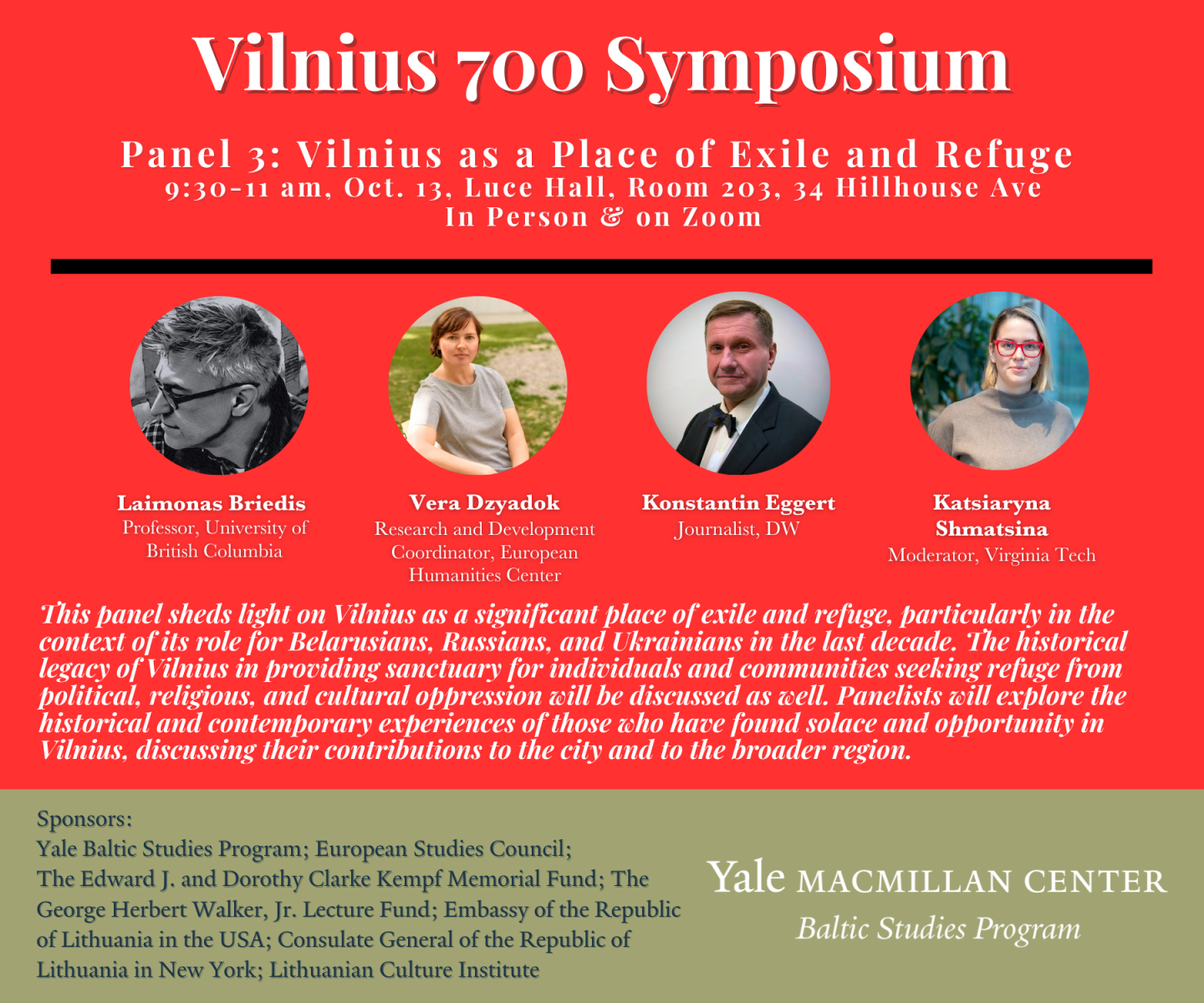
11:00 - 11:15 am
Coffee Break
11:15 am - 12:45 pm
Panel 4: Vilnius as a Place of Education
This panel explores Vilnius as a dynamic center of education, focusing on the city’s continuing significance in academic tradition laid by Vilnius University from the 16th century to today. Vilnius has been a nurturing environment for intellectual growth, knowledge exchange, and academic excellence, including as a shelter to Europe’s first university-in-exile – the European Humanities University. Panelists will delve into the city’s rich educational heritage, highlighting the milestones and contributions made by its universities and scholars throughout history.
The panel will explore Vilnius as a hub of innovation in school education, examining its current role in pioneering new approaches to teaching and learning. By examining Vilnius as a place of education, this panel seeks to celebrate its legacy, highlight its commitment to intellectual pursuits, and explore its future as an incubator for academic advancement.
Unė Kaunaitė (EDU Vilnius)
Professor Cecile E. Kuznitz (Bard College)
Rector Professor Krzysztof Rybiński (European Humanities University)
Moderator: Dr. Arvydas Grišinas (Kaunas University of Technology / Yale University)
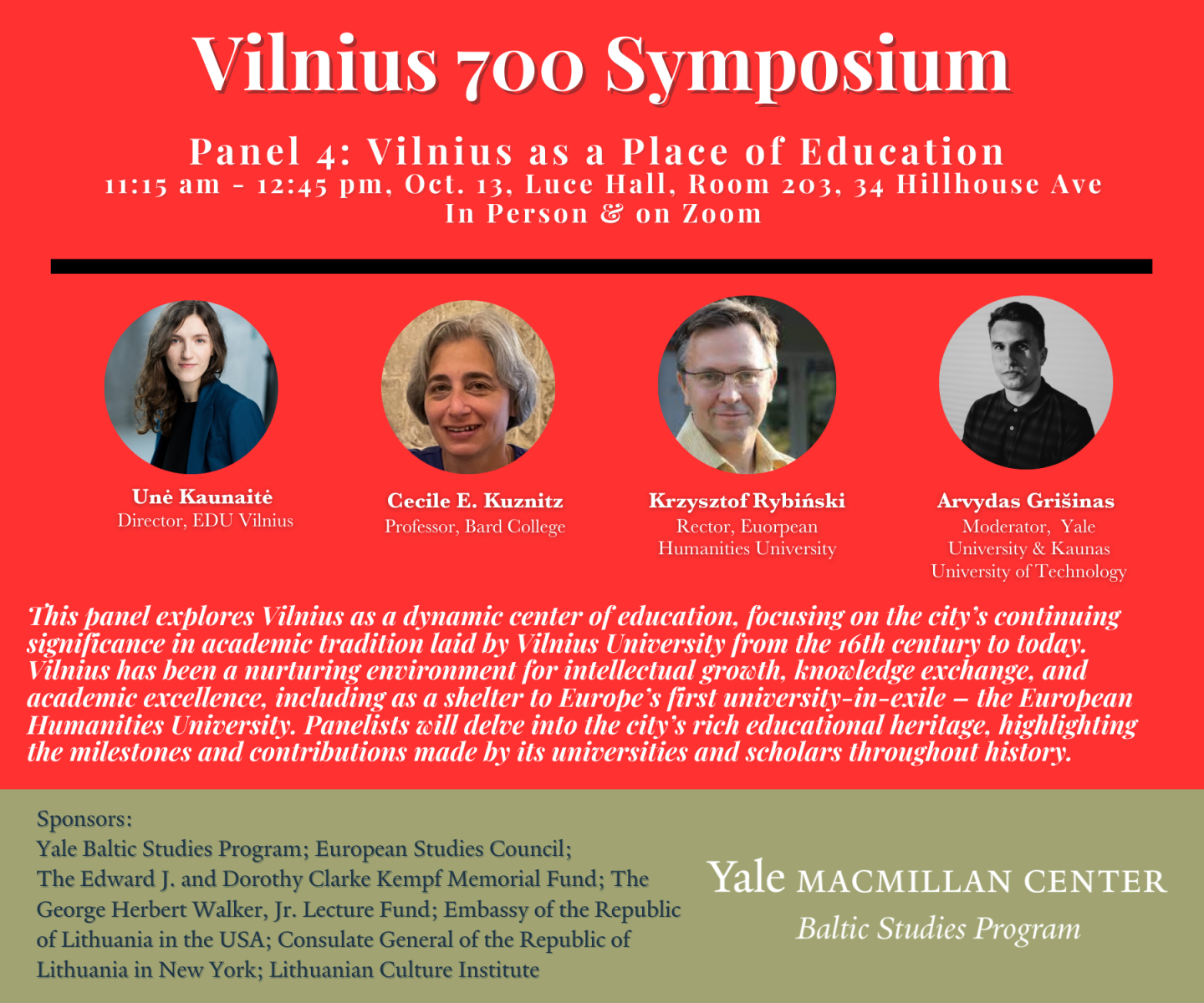
12:45 pm - 1:15 pm
Concluding Remarks: Quo Vadis, symposium Vilnensis?
In this panel, moderators of the symposium share their takeaways from the discussions and suggest further avenues to continue the art of discovering and unfolding the tapestry of Vilnius’ polyphony in the context of the city’s historical significance, as well as challenges and opportunities facing Vilnius in a rapidly changing world.
Dr. Arvydas Grišinas (Kaunas University of Technology / Yale University)
Katsiaryna Shmatsina (Virginia Tech)
Dr. Bradley Woodworth (Yale University / University of New Haven)
Moderator: Maksimas Milta (Yale University)
Panelist Bios
 |
KEYNOTE: Kristina Sabaliauskaitė is an art historian, doctor honoris causa of Vilnius Academy of Arts and is one of the most prominent contemporary Lithuanian writers. Born in Vilnius, she has been based in London since 2002. She worked as a foreign correspondent in London and columnist for Lithuania’s largest daily newspaper until 2010. She is best known for her opus magnum, the historical novel Silva Rerum and the international bestseller Peter’s Empress. |
 |
Jonathan Brent is a historian, publisher, translator, writer, and teacher. For eighteen years (1991-2009) he was Humanities Senior Editor and then Editorial Director at Yale University Press where he established the Annals of Communism series. His books include Stalin’s Last Crime (2003); and Inside the Stalin Archives (2008). Brent has translated poems of Joseph Brodsky and Vladimir Mayakovsky and teaches history and literature at Bard College. He is currently writing a study of Stalin’s seizure of power and finishing a novel. In 2009, Brent became Executive Director and CEO of The YIVO Institute for Jewish Research where he initiated The Edward Blank YIVO Vilna Online Collection Project in 2014, an international project to conserve and digitize all of YIVO’s pre-WW II collections in New York City and Vilnius, Lithuania. In 2018, Brent initiated the development of the YIVO Digital Museum of East European and Russian Jewish Life. In 2019 Jonathan Brent received the Cross of the Knight of the Order for Merits to Lithuania by H.E. Dalia Grybauskaitė, President of the Republic of Lithuania. The award was given to Mr. Brent in recognition of his work in promoting cooperation between Lithuania and YIVO and for the preservation of the prewar Jewish archives of Lithuania. Brent lectures and publishes widely on Jewish, Soviet, and East European history. He has made three documentaries about his work: Stalin’s Last Plot (2009); Stalin: Man of Steel (2003); Declassified: Stalin (2006); and How to Become a Tyrant (2021, Netflix). His articles have appeared in The New York Times, Commentary, The American Scholar, The New Republic, The New Criterion, The Chronicle of Higher Education, and numerous other journals and newspapers. He is now participating in a documentary on the life and disappearance of Raul Wallenberg. His books have been translated into French, Swedish, Spanish, Russian, Chinese, Portuguese, and Polish. |
 |
Laimonis Briedis is a writer and scholar of history, literature and the geographical imagination of Vilnius. He holds a doctoral degree in human geography from the University of British Columbia and did his postdoctoral research in the History Dept. of the University of Toronto. He is the author of Vilnius: City of Strangers, which has been translated into Lithuanian, German, Chinese, Russian and Portuguese (Brazil). |
 |
Jūratė Čerškutė, Lithuanian literary scholar and critic. In 2014, she received her PhD with a thesis entitled “Deconstruction in Ričardas Gavelis’s Prose“. Her research interests are focused on contemporary Lithuanian fiction and culture. She is a researcher at the Institute of Lithuanian Literature and Folklore and a lecturer at the University of Warsaw. In 2023 she received the Critic of the Year Award for her engagement and active response to literary processes and criticism relevant to a wide audience. |
 |
Violeta Davoliūtė is Professor at the Institute of International Relations and Political Science, Vilnius University, Senior Researcher at the Lithuanian Institute of History, and Project Leader of Facing the Past: Public History for a Stronger Europe (Horizon Europe, 2022-2025). A graduate of Vilnius University, she completed her M.A. and Ph.D. at the University of Toronto and has since held fellowships at the Vienna Wiesenthal Institute for Holocaust Studies, Imre Kertész Kolleg Jena, Yale University, EHESS, and Upsala University. Her most recent publications include: “The Gaze of the Implicated Subject: Non-Jewish Testimony to Communal Violence during the German Occupation of Lithuania.” East European Politics and Societies, 37(2) (2023): 493–511, and “Agonistic homecomings: Holocaust postmemory, perspective and locality.” Memory Studies, 15(3) (2022): 539–550. |
 |
Vera Dzyadok is a translator and cultural manager from Belarus, currently serving as the Research and Development Manager at the European Humanities University, a Belarusian exile university located in Vilnius, Lithuania. Her research interests primarily focus on decolonization and cultural politics in the Belarusian Soviet Republic. |
 |
Konstantin Eggert is a freelance journalist, political analyst and communications consultant. He is currently programme host and commentator on Russian affairs for DW (Deutsche Welle), Germany’s international broadcaster. In a career spanning 30 years Konstantin Eggert was Moscow Bureau Chief for the BBC Russian Service, programme host and political commentator for TV Rain (TV Dozhd), Russia’s groundbreaking independent TV channel, as well as editor of Kommersant FM, Russia’s premier 24-hour news radio. Mr. Eggert started his career in 1990 as a reporter for the Moscow daily “Kuranty”, to continue in 1992-1998 as Diplomatic Correspondent, and later Deputy Foreign Editor of Izvestia daily. His assignments included, among other areas, the Middle East, Iraq, Iran, Tajikistan, Afghanistan and the Balkans. In 2009-2010 Mr Eggert took a break from journalism to work in the corporate sector. He was Vice-President for Public and Government Affairs for ExxonMobil Russia Inc. in charge of government relations and communications. In 2008 Queen Elizabeth II created Konstantin Honorary Member of the Most Excellent Order of the British Empire. Also in 2008 President Valdas Adamkus awarded him Commander’s Cross of the Order of Merit of Lithuania. Born in Moscow, Konstantin Eggert is an honours graduate of the Moscow University Institute of Asian and African Studies (MA in history and Arabic language). He speaks English, French and Arabic. Konstantin has been married to Natalya since 1996, they have two daughters and a son. |
 |
Arvydas Grišinas is a Researcher at Kaunas University of Technology. He also held visiting scholar positions at Yale University, Uppsala University (Sweden) and Institute for Human Sciences (Austria). His work centers on post-Soviet political identity formation in Central and Eastern Europe. He received his Ph.D. in Politics and Government from the University of Kent (Great Britain) in 2015, having finished his undergraduate education in History and Anthropology at Vilnius University (Lithuania). Dr. Grišinas is the author of a book titled Politics with a Human Face: Identity and Experience in Post-Soviet Europe (Routledge, 2018) that examines how identity formation, symbolism, historical narratives, political images, and other human factors shape politics in Lithuania, Russia, Ukraine, and the rest of the post-Soviet European region. He is currently working on a second book, exploring the challenges that the current technological, political and intellectual developments present to the enlightened processes of truth and meaning-making in politics, war and culture. The book explores topics of symbolism, performative politics and practices of truth as the ground for the emerging new Intuitive Politics, as it unfolds in both Eastern Europe and the West. |
 |
Unė Kaunaitė is the director of EDU Vilnius, the Centre for Education Improvement in Vilnius. EDU Vilnius is responsible for improving education quality in the capital of Lithuania through various initiatives, including piloting and scaling innovative education practices in schools, improving teachers’ competences, attracting and training new teachers and school leaders and collecting necessary data to advice municipality for needed education policy changes. Previously, Ms. Kaunaite served as an advisor for education, science, culture and sports to the Prime Minister of Lithuania under XVII Government for four years. She has been a member of various committees and working groups, solving such questions as general curriculum reform, recognition of non-formal and informal learning or teacher training in Lithuania. Une Kaunaite holds a Master of Philosophy degree in Education from the University of Cambridge. She also is a writer, with four published novels. |
 |
Cecile E. Kuznitz is Associate Professor and Patricia Ross Weis ‘52 Chair in Jewish History and Culture at Bard College (Annandale-on-Hudson, NY). She is the author of YIVO and The Making of Modern Jewish Culture: Scholarship for the Yiddish Nation as well as numerous articles on the Jewish community of Vilna, the history of Yiddish scholarship, and Jewish urban history. She has held fellowships at YIVO, the United States Holocaust Memorial Museum, the Oxford Centre for Hebrew and Jewish Studies, and the Center for Advanced Judaic Studies at the University of Pennsylvania. In 2022 she was a Lady Davis Fellow at the Hebrew University of Jerusalem. |
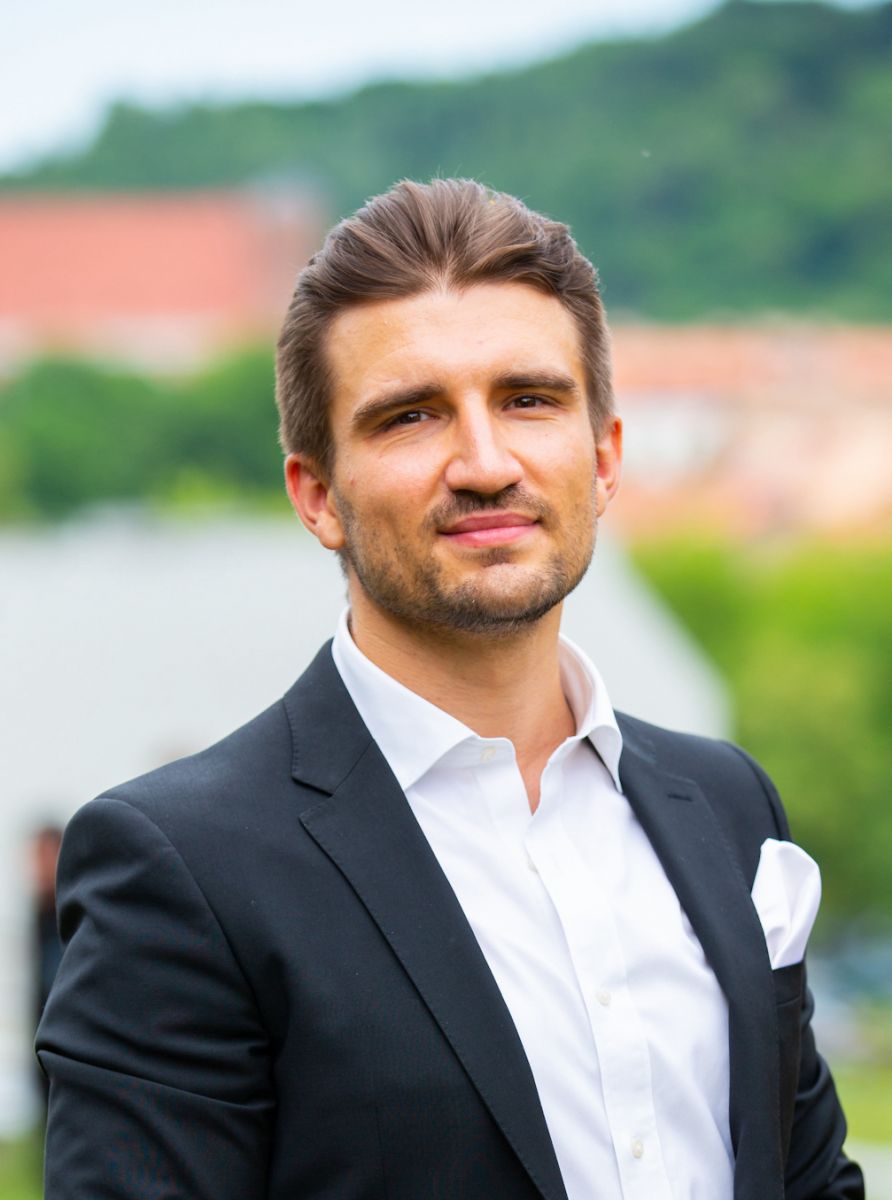 |
Maksimas Milta is a former graduate student in European & Russian Studies at Yale (Class 2023). He is an Associate Expert at the Eastern Europe Studies Centre and a former ReThink.CEE Fellow at the German Marshall Fund of the US. Maksimas is a frequent commentator on Belarus and Eastern European affairs; also, he hosted an award-winning 10-episode documentary exploring the role of Belarusian women during the 2020 protests. Before Yale, Maksimas worked at the European Humanities University, a Vilnius-based Belarusian University-in-Exile. |
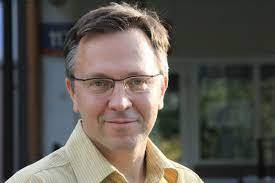 |
Krzysztof Rybiński is the Rector of the European Humanities University. He is an experienced lecturer at both the undergraduate and graduate levels and has written more than 90 scholarly articles in economics, hundreds of newspaper articles, and several books. In recent years, his research has focused on using artificial intelligence in fields such as economics, management, and higher education. In addition to his academic background, he has extensive public policy and private sector experience. Professor Krzysztof Rybinski speaks fluent English, Russian, and Polish. |
 |
Katsiaryna Shmatsina is an independent policy analyst and a Ph.D. fellow at Virginia Tech (Washington D.C.), specializing on Belarusian foreign policy and Eurasia security. |
 |
Timothy Snyder is the Richard C. Levin Professor of History and Global Affairs at Yale University and a permanent fellow at the Institute for Human Sciences in Vienna. He speaks five and reads ten European languages. He has written several books, including Bloodlands: Europe Between Hitler and Stalin, On Tyranny: Twenty Lessons from the Twentieth Century, The Road to Unfreedom, and Our Malady. Snyder’s work has appeared in forty languages and has received a number of prizes, including the Emerson Prize in the Humanities, the Literature Award of the American Academy of Arts and Letters, the Václav Havel Foundation prize, the Foundation for Polish Science prize in the social sciences, the Leipzig Award for European Understanding, the Dutch Auschwitz Committee award, and the Hannah Arendt Prize in Political Thought. Snyder was a Marshall Scholar at Oxford, and has received the Carnegie and Guggenheim fellowships, and holds state orders from Estonia, Lithuania, and Poland. He has appeared in documentaries, on network television, and in major films. His books have inspired posters, sculpture, punk rock, rap, film, theater, and opera. His words are quoted in political demonstrations around the world. He is currently researching a family history of nationalism and writing a philosophical book about freedom. Snyder serves on the Committee on Conscience of the United States Holocaust Memorial Museum. He is also a member of the Council on Foreign Relations. |
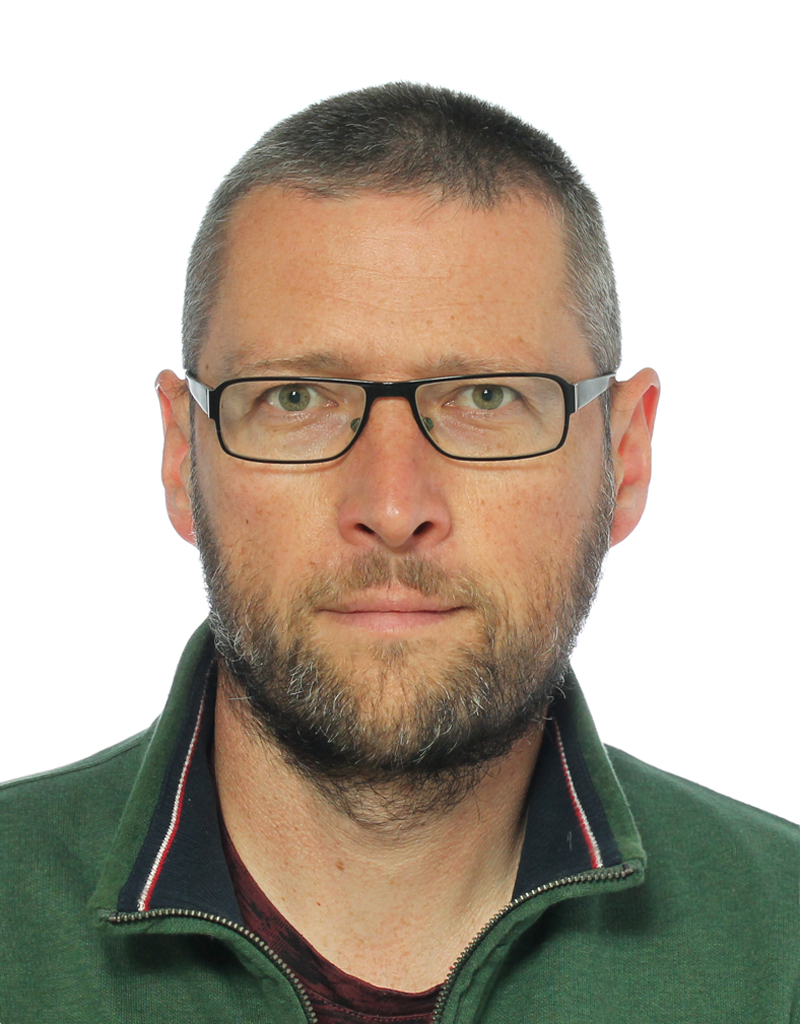 |
Darius Staliūnas is Chief Researcher at the Lithuanian Institute of History, Project Leader of Geneology of Confict in Modernizing Society: the Case of Lithuania (2022-2026), and also teaches at Vilnius University. His academic interests include Russia‘s nationality policy in the so-called Northwestern Region (Lithuania and Belarus), ethnic conflicts, problems of historiography, and places of memory in Lithuania. He is the author of Making Russians: Meaning and Practice of Russification in Lithuania and Belarus after 1863 (Amsterdam: Rodopi, 2007), Enemies for a Day: Antisemitism and Anti-Jewish Violence in Lithuania under the Tsars (Budapest: CEU Press, 2015), and, with Dangiras Mačiulis, Lithuanian Nationalism and the Vilnius Question, 1883–1940 (Marburg: Herder-Institut, 2015). |
 |
Ambassador Irena Vaišvilaitė is a Lithuanian historian and diplomat who served as Lithuanias Ambassador to the Holy See and later Permanent Representative to the United Nations Education, Scientific and Cultural Organization (UNESCO). She taught at the Lithuanian Art Institute from 1978 to 1986 and Vilnius University as an associate professor from 1998 to 2012. From 1986 to 1991, she worked at the Lithuanian Institute of Philosophy and Sociology. She was editor of Vatican Radio programs for Lithuania between 1991 and 1998 and later served as editor of Radio Free Europe in Prague from 2001 to 2004 before her appointment as chief adviser to President Valdas Adamkus from 2004 to 2007. She was then appointed vice-rector of the European Humanities University in Vilnius from 2008 until 2012 when she became the Lithuanian ambassador to the Holy See and to the Order of Malta. She was redeployed to UNESCO in 2017 and served there till 2019. Throughout her lifetime of service, she has continued to teach part-time and do research, as well as direct PhD students. |
 |
Tomas Venclova is a Lithuanian poet, prose writer, scholar, philologist and translator of literature. He is one of the five founding members of the Lithuanian Helsinki Group. In 1977, following his dissident activities, he was forced to emigrate and was deprived of his Soviet citizenship. Since 1980, he has taught Russian and Polish literature at Yale University. Considered a major figure in world literature, he has received many awards, including the Prize of Two Nations (received jointly with Czesław Miłosz), the Person of Tolerance of the Year Award from the Sugihara Foundation, and International Zbigniew Herbert Award (2023), among other honors. |
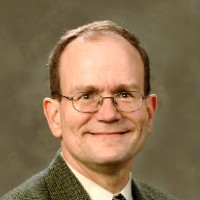 |
Theodore R. Weeks is Professor of History at Southern Illinois University at Carbondale, where teaches courses in modern world, European, and Russian history. He has also taught at the College of Europe, Natolin (Warsaw) and spent one year as Distinguished Fulbright Professor at the University of Warsaw. Among his works are Nation and State in Late Imperial Russia: Nationalism and Russification on the Western Frontier, 1863-1914 (1996), From Assimilation to Antisemitism: the “Jewish Question” in Poland, 1850-1914 (2006), and Vilnius between Nations 1795-2000 (2015). His research interests include nationalism, ethnic relations, antisemitism, and, more recently, the history of technology. He is presently working on a history of radio in interwar Poland (1920-1939). |
 |
Bradley D. Woodworth is Coordinator of Baltic Studies at Yale University and Associate Professor of History at the University of New Haven. His research interests include the modern history of the Baltic region – particularly the lands that comprise the Republic of Estonia – and also the history of the multiethnic Russian Empire in the tsarist period, including Finland. He is co-editor (with Karsten Brüggemann) of Russland an der Ostsee. Imperiale Strategien der Macht und kulturelle Wahrnehmungsmuster (16. bis 20. Jahrhundert / Russia on the Baltic: Imperial Strategies of Power and Cultural Patterns of Perception (16th-20th Centuries) (Cologne, 2012). His most recent articles include “Carl Gustaf Emil Mannerheim,” in Russia’s People of Empire: Life Stories from Eurasia, 1500 to the Present, edited by Stephen M. Norris and Willard Sunderland (Bloomington, 2012); “Music Associations and National Identity in Russia’s Baltic Provinces: The Case of Tallinn, 1850-1914,” in Vereinskultur und Zivilgesellschaft in Nordosteuropa. Regionale Spezifik und europäische Zusammenhänge, edited by Jörg Hackmann (Cologne, 2012); and “Multiethnicity and Estonian Tsarist State Officials in Estland Province, 1881-1914,” in Russian Bureaucracy and the State: Officialdom from Alexander III to Putin, edited by Donald K. Rowney and Eugene Huskey (Basingstoke, 2009). |